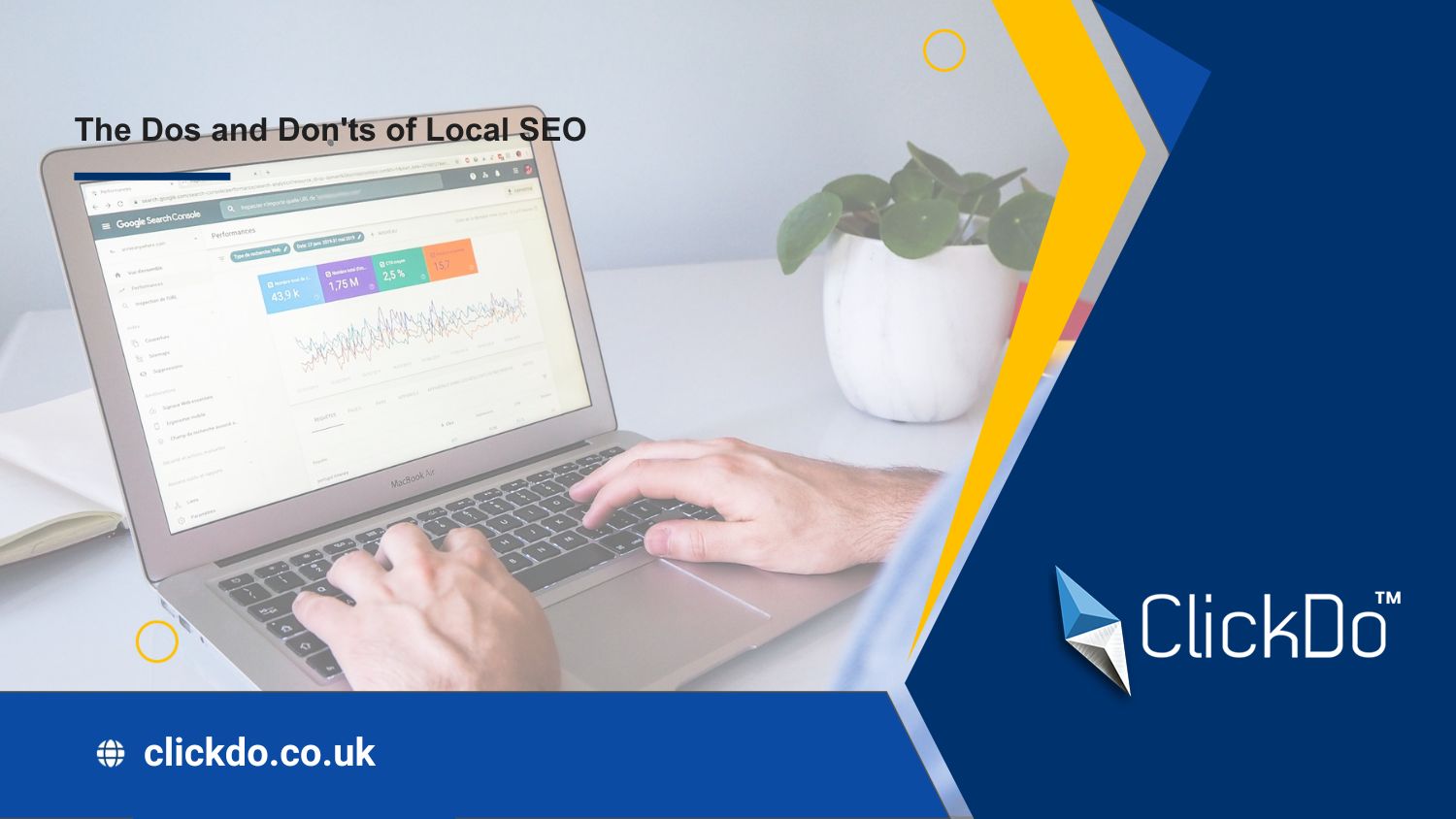
The Dos and Don’ts of Local SEO
For businesses to gain traction and generate sales, they need to be visible to their target audience—that is, the people who are most likely to want what they’re selling.
Perhaps the best way to get your brand in front of the right eyeballs over the past couple of decades has undoubtedly been by using search engine optimization tactics that boost your website in search engine results.
While times are changing in terms of how people use and interact with the web, search remains an integral tool in any online marketer’s toolbox, and SEO, in particular, is the fuel that one uses to stoke the fires of success.
However, just as is the case with regular SEO, local SEO requires a little more finesse than merely setting up a Google My Business page and calling it a day. This post will look at four “Dos” and four “Don’ts” when it comes to mastering the dark arts of local SEO.
DO Claim Your Google My Business Account
 Let’s begin with the very thing that I mentioned in the introduction: setting up and claiming your business account on Google. While you need to do far more than simply claim it, claiming it is nevertheless the first step.
Let’s begin with the very thing that I mentioned in the introduction: setting up and claiming your business account on Google. While you need to do far more than simply claim it, claiming it is nevertheless the first step.
These Melbourne SEO professionals note that Google will give you more credit and raise your site’s search engine rankings if your Google My Business profile is complete and optimized, with the key word here being: “optimized.” There are many things you can do to optimize your account, including:
- Use your actual business name so that anyone ending up on a search result that includes your GMB as a Google Knowledge Graph can connect the dots and interact with confidence.
- Avoid setting up multiple versions in an effort to spam it.
- Write a compelling description that gives users an idea of who you are and what you do.
- Upload plenty of compelling, high-res images related to your business and services.
- Include your contact details so that potential customers can contact you directly based on the result.
- Post updates to keep things fresh and interactive.
By nurturing this property, you will dramatically improve your visibility and brand awareness, hopefully turning casual searchers into actual customers.
DO Use Location-Specific Keywords On Your Website
Keywords are vital for enabling Google and other search engines to grasp where you operate from and, therefore, where to place you regarding location-specific search queries. The idea is to avoid stuffing the locations where you do business into your content but rather use it in title tags and gently throughout the content.
DO Avoid Duplicate Content
 Your local SEO campaign will take a major hit if you publish duplicate material. All search engines thrive on unique and original material that they can offer to their users in the hopes of remaining relevant. An example of duplicate content, and one that is frequently used by less experienced or casual SEOs, is to copy and paste their service pages, only changing the location.
Your local SEO campaign will take a major hit if you publish duplicate material. All search engines thrive on unique and original material that they can offer to their users in the hopes of remaining relevant. An example of duplicate content, and one that is frequently used by less experienced or casual SEOs, is to copy and paste their service pages, only changing the location.
This is not looked upon favorably by search engines, and although it won’t necessarily result in penalties, you may find that your various pages simply aren’t ranking. Writing fresh content for a page can become pretty mundane if you happen to serve lots of areas, but the payoff is more exposure and better rankings.
DO Utilize Social Media For Outreach
Although not directly related to SEO, social media is the 100 kg gorilla in the room that must be tackled if you want to boost your results. You should already have some form of social media presence, but just as with your GMB account, it should be optimized and showcase your products and services effectively enough to complement your website. You can also use your various channels to interact directly with your customers much faster than you could using conventional methods.
DON’T Neglect Online Reviews
 Reviews can make or break a business, but just burying your head in the sand and refusing to respond to them can cause issues in more ways than one. While not proven, answering, and responding to all your reviews (especially those placed on your GMB page) can indicate to the big G that you are a real business and have an interest in offering quality. You can also show potential customers that you take their feedback seriously and that if there is an issue, you are attempting to remedy it rather than ignore it.
Reviews can make or break a business, but just burying your head in the sand and refusing to respond to them can cause issues in more ways than one. While not proven, answering, and responding to all your reviews (especially those placed on your GMB page) can indicate to the big G that you are a real business and have an interest in offering quality. You can also show potential customers that you take their feedback seriously and that if there is an issue, you are attempting to remedy it rather than ignore it.
DON’T Ignore Google’s Guidelines
Depending on the SEO publications and forums you frequent, Google’s guidelines are either there to fool you by offering red herrings or as a guide that you should follow to the letter. Like many things in life, the true answer probably lies somewhere in the middle.
For example, Google discourages webmasters from relying too heavily on backlinks, but links are still a proven tactic for improving rankings. However, you shouldn’t completely ignore that advice because the wrong type of links can have adverse effects and could potentially harm your business in the long run. If you have a general understanding of their guidelines, you will be better positioned to perform the kind of SEO that makes a difference.
DON’T Stuff Keywords Unnaturally

One of the “Dos” mentioned earlier regarded keywords and how they can be used to help search engine bots understand how to rank a page. This is true and should be adhered to, but you can fall foul if you opt to stuff too many into any given content. Keyword stuffing hasn’t been a viable tactic for decades, and in the best-case scenario, you will simply make your content look utterly unreadable and unnatural to your visitors, who may decide that your operation is nothing more than a spam site. Use your local keyword in the title once or twice throughout the content; that should do the job.
DON’T Ignore Local Citations
Local citations are critical to enhancing your local SEO efforts. Citations assist search engines in verifying the validity and location of your business, which influences your ranking. You must, however, guarantee that your company information is constantly featured in all web directories. Inaccurate information might mislead search engines and potential clients, resulting in reduced exposure. Audit your citations on a regular basis to ensure that they are up-to-date and free of errors. Engaging with local directories and industry-specific websites increases your visibility and reputation. Strong local citations will help your entire SEO strategy by making it easier for people to locate and trust your business.
Local SEO can be a massive boon to your business if done right. This means following best practices within reason and staying up to date with any changes, algorithmically or otherwise, that could affect your rankings.
Author Profile
- As the Chief of Marketing at the digital marketing agency ClickDo Ltd I blog regularly about technology, education, lifestyle, business and many more topics.
Latest entries
 Digital MarketingMarch 25, 2025Why SEO is a Must for Modern Marketing
Digital MarketingMarch 25, 2025Why SEO is a Must for Modern Marketing Digital MarketingMarch 10, 2025Beyond SEO: How Search Data Powers Market Research and Trend Analysis
Digital MarketingMarch 10, 2025Beyond SEO: How Search Data Powers Market Research and Trend Analysis Digital MarketingMarch 6, 20258-Step Guide to Crafting a Winning Marketing Strategy for Your Small Business
Digital MarketingMarch 6, 20258-Step Guide to Crafting a Winning Marketing Strategy for Your Small Business Digital MarketingFebruary 25, 2025How Tailored SEO can Drive Traffic Across Various Industries
Digital MarketingFebruary 25, 2025How Tailored SEO can Drive Traffic Across Various Industries

